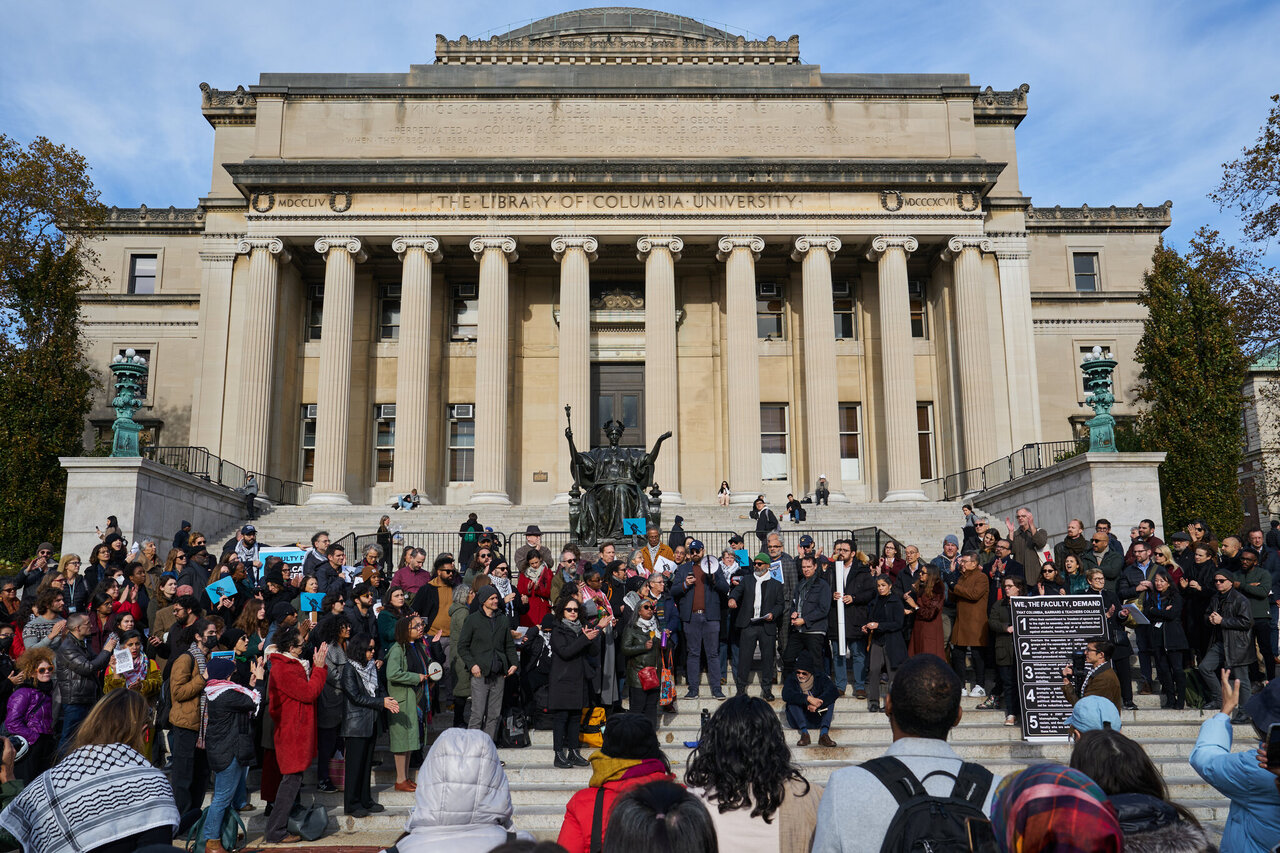By Mona Hojat Ansari
Retired Columbia professor discusses anti-Israeli student protests with Tehran Times

TEHRAN - A group of demonstrators supporting the Palestinian cause set up tents on Columbia University's Manhattan campus on April 17 with the singular aim of urging the institution to cut financial ties with Israel.
Fast forward nearly a month, and hundreds of Columbia students have been forcefully arrested following the intervention of riot police by the administration, leading to dozens being either suspended or expelled.
While the unfolding events at the university have been distressing and acrimonious for the involved students, their actions sparked a ripple effect that spread to numerous other universities across the U.S., as well as several institutions in Europe, Asia, and Australia.
Partha Chatterjee, a political theorist, political anthropologist, and historian, served as Professor Emeritus of Anthropology and Middle Eastern, South Asian, and African Studies at Columbia University for many years before retiring three years ago. We reached out to him for insights into the situation at Columbia and other American universities.
The full text of the interview is as written below:
Q: You have taught for over two decades in American universities. In your experience, does Israel have a significant influence on the teaching and research on Palestine in American universities?
A: From what I know of the major US universities, teaching and research on specific topics are never influenced directly by outside agencies. They are left entirely to the academic judgment of the professor. Broad trends of research are, of course, affected by the availability of funding in particular areas and course offerings shaped by the preferences of students. Teaching and research on Palestine have been relatively limited in U.S. universities. As far as I know, Columbia University has the only Centre for Palestine Studies in the entire country. However, the history and politics of the Middle East are much studied and taught. I am not aware of any direct Israeli influence in that academic field. But the ideological balance in the courses offered and research conducted would, I think, reflect in general the prevalent American attitude towards Israel.
Q: What are your thoughts on the allegations that the recent pro-Palestine protests at American universities are motivated by antisemitism?
A: I was not present in New York during the recent events. But I have followed them closely in the media as well as in email conversations with faculty and former students. I think the way accusations of antisemitism have been flung at the protesters is utterly absurd. My own sense is that during the first stage of demonstrations, various abusive epithets were shouted from both sides. As soon as some Jewish students complained of antisemitism and a lack of security, the protest organisers became extremely careful not to provide any opportunity for the charge of antisemitism to be levelled against them. Even when repeatedly provoked by pro-Israel agitators, the protesting students did not react. In the end, sections of the media and politicians began to equate antisemitism with any opposition to Israel's policies. This is a travesty.
Q: How do you think the heavy-handed response by university administrators to protesting students will impact the academic environment in the U.S.?
A: I think the atmosphere in many U.S. universities will remain disturbed for some time. The protests may die down over the summer. But what has been severely damaged is the trust between the faculty and the administration. The authoritarian use of the armed police to break up peaceful protests and the arrest of hundreds of students has shocked the faculty. This is certain to affect the academic atmosphere and the smooth running of the university. I fear the faculty and administration will continue to clash over a lot of issues.
Q: You have stated in the past that you have always boycotted Israeli institutions. Why do you believe that such a move is important?
A: I can only speak for myself. I was born in 1947 in India and grew up with the knowledge of the terrible persecutions suffered by Jews in Europe before and during World War II, the creation of Israel as a settler colony of European Jews in West Asia at a time when European colonialism was being abolished everywhere else and the forcible eviction of millions of Palestinians from lands in which they had lived for centuries. As an Indian citizen, I could not easily travel to Israel since there was no Israeli embassy in India. Later, when diplomatic relations were established, I could not bring myself to apply for an Israeli visa. This meant that I have only been able to meet some of my close academic friends in Israeli universities in other countries. I also had to turn down invitations to Israel, including one for the release of one of my books in Hebrew translation. The saddest part of this story is that I have also had to give up the chance of visiting Palestinian universities since the Israeli occupation requires me to obtain an Israeli visa to go to Palestine. I have always supported the BDS Israel movement, just as I supported the BDS South Africa movement earlier. But my reasons are my own. I don't expect others to endorse my reasons.
Q: Do you believe that professors and lecturers at American universities are self-censoring their views on Israeli actions due to fear of professional repercussions?
A: I would be very surprised if senior faculty are censoring themselves. That has not happened since the 1960s when I first encountered the US university as a student. However, the situation has always been different for those at the beginning of their careers, waiting for research grants and tenure. They are usually advised to stay away from controversy.

No comments:
Post a Comment